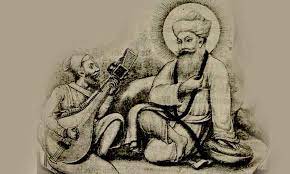Explore Ram Singh's impact in aiding the 1848 anti-British rebellion, including hosting rebels at his dharamsala in Zahura and introducing them to key allies.
Explore the spiritual importance of sarovars, sacred bodies of water at holy sites, symbolizing purity and renewal in various religious traditions.
Discover the profound meaning of Ardas, a central supplication in Sikh rituals, reflecting a rich history of dedication and spiritual unity.
DARBAR, a Perisan word meaning "a house, dwelling; court, area; court or levee of a prince; audience chamber," is commonly used in Punjabi to signify a royal, princely or any high ranking officer`s court (as distinguished from courts of justice) where dignitaries granted audience to the common people, listened to their grievances, or deliberated with their darbaris (courtiers) on matters of public interest. In Sikhism the term came to have extended meaning as Guru Nanak and his holy successors introduced terms such as sacha patisahu, True Emperor (GG, 17, 18, 463 etal.), siri saha patisahu, at the head of kings and emperors (GG, 1426) for God Almighty.
Dive into Makkhan Shah's journey, a trader of the Lubana clan, who discovered Guru Tegh Bahadur amid contenders in 1664, marking a pivotal Sikh moment.
Discover the heroic legacy of Santa Singh, a revered martyr from a humble barber family, who inspired many with his devotion and sacrifice at Nankana Sahib.
Explore how Hinduism honors ancestors with rituals deemed sacred, contrasting with Sikhism's focus on prayer over offerings. Learn more here.
DEATH, the primordial mystery and one of the cardinal conditions of existence. Scientifically, death is defined as "the permanent cessation of the vital function in the bodies of animals and plants" or, simply, as the end of life caused by senescence or by stoppage of the means of sustenance to body cells. In Sikhism the universal fact of mortality is juxtaposed to immortality (amarapad) as the ultimate objective (paramartha) of life. As a biological reality death is the inevitable destiny of everyone. Even the divines and prophets have no immunity from it. Mortality reigns over the realms of the gods as well.
Explore the inspiring life of Sant Mela Singh, a revered Sikh saint who spread faith and harmony across Kashmir and Punjab.
Discover the profound insights of ANT KAL, the moments before death. Embrace these last reflections through meditation and remembrance.




